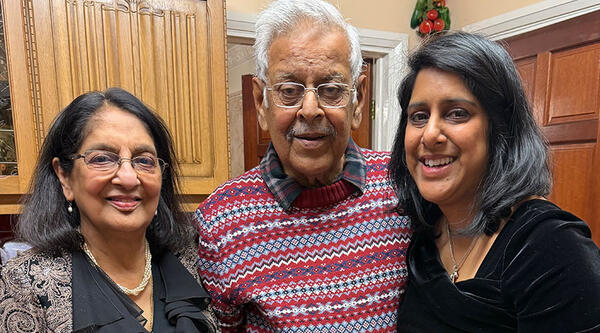Planning ahead using the Mental Capacity Act
A person with dementia can use the Mental Capacity Act to plan ahead in case they lose mental capacity to make certain decisions in the future.
Mental Capacity Act
- Dementia and the Mental Capacity Act 2005
- Assessing the mental capacity of a person with dementia
- Making decisions for a person with dementia who lacks mental capacity
- You are here: Planning ahead using the Mental Capacity Act
The Mental Capacity Act created a number of ways for a person to plan ahead in case they can’t make decisions for themselves in the future. This means the person can make sure that what they want to happen will happen, even if they can’t decide or communicate their views in the future.
This means the person can make sure that what they want to happen will happen. This is even if they can’t decide or communicate their views in the future. This section describes ways that people can put plans for the future in place, if they want to.
Who a person with dementia appoint to make decisions for them in the future?
A Lasting power of attorney (LPA)
A Lasting power of attorney (LPA) enables a person to appoint someone they trust to make decisions for them in the future. This is if they can’t make a certain decision or decisions for themselves. The person (or people) they appoint will become their ‘attorney’.
To make an LPA, a person needs to fill in a specific application form. This form needs to be signed and witnessed by various people before it is registered with the Office of the Public Guardian (OPG). An LPA must be registered before it can be used.
There are two types of LPA. They each relate to different decisions. A person can have both types of LPA, but to do this they will need to complete both forms. The two types of LPA are:
- LPA for property and financial affairs. This gives the attorney or attorneys the power to make decisions about things like selling the person’s house or managing their bank account.
- LPA for health and welfare. This gives the attorney or attorneys the power to make decisions about the person’s health and personal welfare. These include day-to-day care, medical treatment or decisions about where they might live, such as a care home. This is so that they can receive care and support.
Lasting power of attorney
A Lasting power of attorney (LPA) is a legal tool that you can use to appoint someone you trust to make decisions on your behalf if you become unable to make them yourself.
Enduring power of attorney (EPA)
You may also hear about Enduring powers of attorney (EPA). These were used before LPAs were introduced under the Mental Capacity Act. If an EPA was made properly and signed before October 2007, it can still be registered and used. An EPA only allows the attorney to make decisions about a person’s finances and property. It does not cover health and welfare decisions.
If you don’t have access to the internet or feel able to complete the LPA forms on a computer, Alzheimer’s Society offers a digital assistance service. We can help you to create an LPA for the person using the Office of the Public Guardian’s online tool. For more information on this service call our support line. The service doesn’t provide legal advice.
Creating an advance decision
The Mental Capacity Act also enables someone to create an advance decision to refuse treatment. This allows them to state the types of treatment they don’t want to have if they don’t have the mental capacity to decide this for themselves in the future. This may include refusing life-sustaining treatment.
A valid advance decision is legally binding. This means health professionals must follow it if the treatment and circumstances that are set out in the advance decision apply to the specific situation the person is in.
To be valid, an advance decision must be made in writing. It must also be signed and witnessed. It can help if the person has a conversation with their GP before they make an advance decision. This is to make sure that the advance decision covers what the person wants it to.
Creating an advance statement
Another way that people can plan ahead is by creating an advance statement. This is where they can set out their wishes and preferences for the future, including both what they want and what they don’t want to happen.
The statement could include:
- their preferences about their care
- where they will live
- what they like or don’t like to eat
- daytime activities they enjoy
- who they do and don’t want to visit them.
Advance statements can be made verbally or in writing. They are not legally binding. However, if someone is making a decision for a person who has made an advance statement, they must take the statement into account when they make the decision.
Advance decisions and advance statements
Advance decisions and advance statements are just two of the ways you can plan ahead. They each do different things.
If someone hasn’t planned ahead: Deputyship
A person with dementia may lose the ability to make some decisions. If they haven’t made an LPA or EPA, it can become difficult for those who are trying to help them. This is especially true for financial decisions. Only someone who has a legal power (such as an LPA, EPA or deputyship) can completely manage another person’s finances.
If you are caring for a person who hasn’t made an LPA or EPA, you will need to apply to the Court of Protection to become their deputy. This is to be able to manage their finances for them. Do note that it can take several months for this to be set up. The process is also more expensive, with a higher cost for applying and ongoing fees after you’ve been appointed.
It is also possible to become a person’s deputy for health and welfare decisions. You will need to show the Court that the person needs to have a deputy. You can do this by showing that ongoing decisions need to be made about the person’s welfare that only a deputy can make.
The Court doesn’t appoint as many deputies for health and welfare. This is because professionals and family members can sometimes work together to make decisions in the person’s best interests. So a deputyship is not always needed.
Deputyship
If a person with dementia loses the ability to make decisions and hasn't appointed anyone to do this for them, you may still be able to take on this decision-making role by becoming a deputy.






